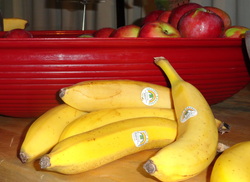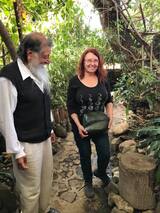
An experience: While I was selecting my breakfast from a buffet table at Omega Institute in Rhinebeck, New York last summer, a young lady was overseeing the apples and bananas. A woman approached and remarked, “Why would they bother with organic bananas?” The young lady responded that she wasn’t quite sure, so I spoke up.
What’s wrong with that approach? The idea that we can throw away the peel from a non-organic banana and have the same benefits as compared to an organic one ignores an important group of people: the workers on the banana plantations who are exposed to highly toxic chemicals. In addition, it ignores the fact that pesticides contaminate the eco-systems of banana-growing regions. NaturalNews.com in June of 2011 asserted that “Twenty-five percent of the world's pesticides are used in third world countries and this is where over 99% of pesticide related deaths occur.” http://www.naturalnews.com/032683_Nicaragua_Nemagon.html
So, at breakfast at Omega, I explained why Omega would choose to serve organic bananas. Serving organic foods has to do with keeping up with sustainable practices, and on its website Omega lists “sustainability” among its values. “We consider the impact of our actions. We advocate for fairness in the treatment of all species, make decisions for the common good, and encourage activism as a means to social justice.” http://eomega.org/omega/about/mission .
Yes, I buy organic bananas whenever I can find them. I can almost always find them where I shop. I purchase as many organic fruits and vegetables as possible, and that has become easier month by month and year by year. As more people have become aware of the reasons to buy organics, more of us have decided to spend the extra cents to protect ourselves, producers, and the natural environment from harmful chemicals. In addition, as the market for organics grows, prices come down. Sometimes, I buy organic produce that costs no more than non-organic. This is especially true at our local farm markets.
Copyright© 2011 by Paulette L. Stenzel for text and photo.

 RSS Feed
RSS Feed